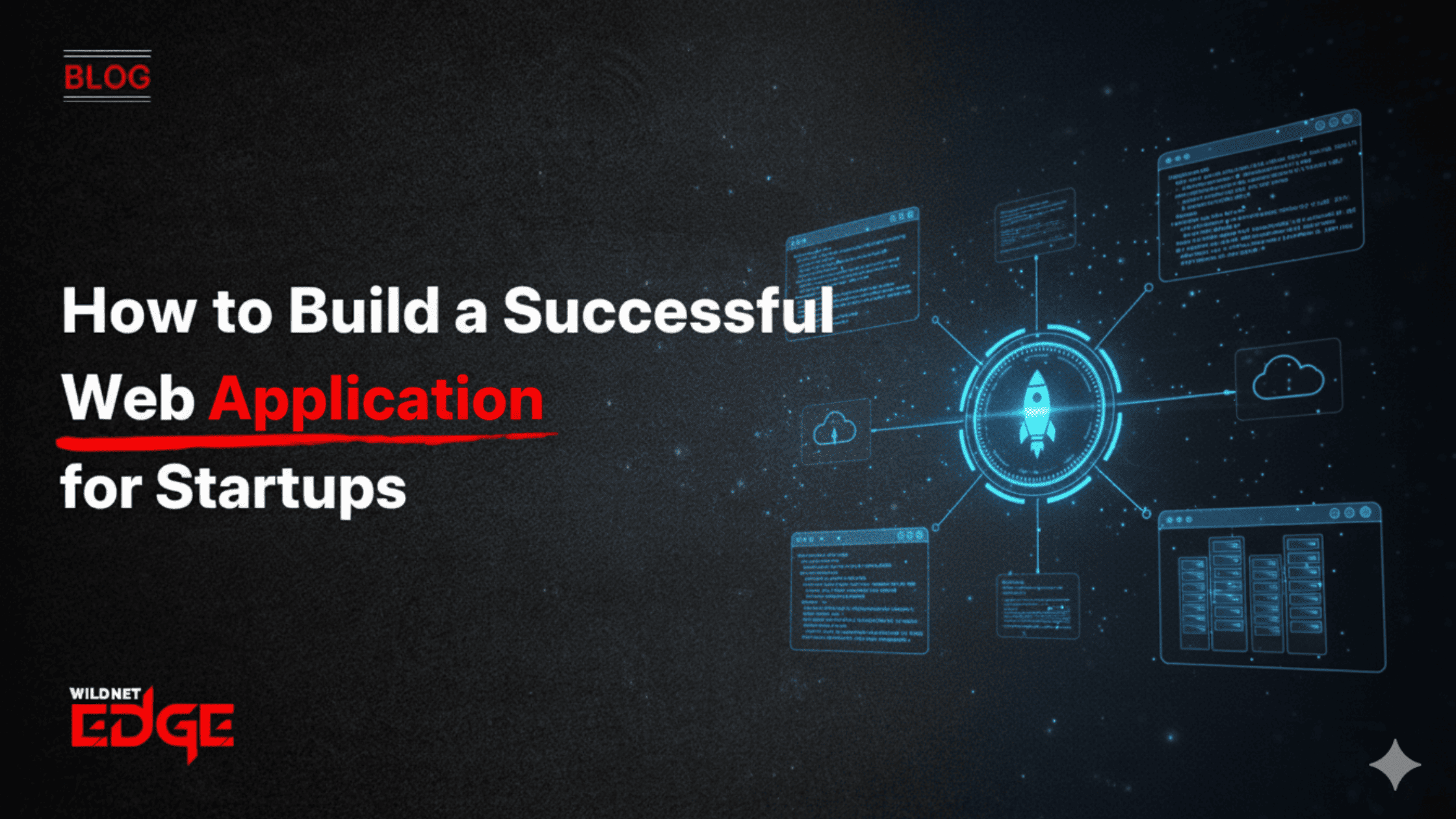TL;DR
This article offers a strategic roadmap for startups building web applications, emphasizing the importance of market validation over just coding. It highlights starting with an MVP to test ideas quickly and cost-effectively, choosing scalable technologies, and iterating based on user feedback. The guide also compares in-house development with expert partnerships, showing how the latter accelerates growth. Ultimately, it presents a well-planned web app as key to achieving product-market fit and sustainable success.
For many startups, the web application is the business. It’s the core product, the primary sales channel, and the main point of interaction with customers. Getting this foundation right is paramount, but the path from a brilliant idea to a successful, scalable application is challenging. A strategic approach to building your web application for startups, focused on lean principles and market validation, is the most effective way to navigate this journey and build a product that truly resonates with users.
Why a Web Application is Often the Starting Point
Mobile applications are significant but, a web app is the starting point or main hub for numerous startups, particularly in the B2B or SaaS realm. The following are the reasons:
- Accessibility: Can be accessed on any device that has a browser, and no app store download is required.
- Faster Updates: The implementation of modifications can be done right away without having to go through the app store review process.
- Cost-Effectiveness (Initial): The total cost of creating just one web app can be less than that of developing two separate native mobile apps.
- Foundation for Mobile: Usually acts as the backend API provider for the mobile applications that are being developed in the future.
The Startup Roadmap: From Idea to Scalable Web App
A successful build follows a structured, iterative process focused on learning and validation.
Phase 1: Idea Validation & Defining the Core Problem
Before writing code, validate your assumptions. Who is your target customer? What specific, high-value problem does your web application solve for them? Conduct customer discovery interviews, analyze competitors, and define your unique value proposition. What makes your web application for startups different and better?
Phase 2: The Minimum Viable Product (MVP) Strategy
Resist the urge to build every feature imaginable. Define the absolute minimum set of features required to solve the core problem for your earliest adopters. This MVP is your tool for rapid market testing and mobile app validation (even if web-based initially). Focus on the core user journey and cut everything else. This lean approach conserves resources and accelerates learning.
Phase 3: Choosing the Right Technology Stack
This is a critical decision impacting speed, cost, and scalability. Consider:
- Scalability Needs: Will your app need to handle rapid user growth or large data volumes? Plan for a scalable architecture for startups.
- Team Expertise: Leverage your team’s existing skills where appropriate, but don’t let it dictate a poor long-term choice.
- Time-to-Market: Frameworks like Ruby on Rails or Node.js/Express are known for rapid development. Partnering with an experienced Web Application Development Company can provide crucial guidance on stack selection.
Phase 4: Architecture Design for Scalability
Even for an MVP, design with future growth in mind. Consider:
- Stateless Application Design: Crucial for horizontal scaling.
- Database Choice: Select a database that can handle your projected data load (SQL vs. NoSQL).
- Cloud Infrastructure: Leverage cloud platforms (AWS, GCP, Azure) for on-demand scalability and managed services. This foundation is key for building scalable web apps.
Phase 5: Agile Development & Iteration
Build your MVP using an agile methodology (like Scrum). Work in short sprints, deliver functional increments, and gather feedback constantly. Be prepared to iterate and pivot based on what you learn from your early users. This iterative process is central to effective Software Development for Startups.
Phase 6: Launch, Measure, Learn
Deploy your MVP and focus intensely on user behavior. Use analytics tools to track engagement, identify drop-off points, and understand which features resonate. Combine this quantitative data with qualitative feedback (surveys, interviews) to inform your product roadmap.
Choosing Your Development Path: In-House vs. Partner
- In-House: Offers maximum control but requires significant upfront investment in hiring and management, often slow to start.
- Freelancers: Lower cost but managing multiple freelancers can be difficult, and quality can be inconsistent.
- Agency Partner: Provides immediate access to a full team of experts, mature processes, and faster ramp-up time. Often the most efficient path for launching an MVP.
Our Startup Web App Development in Action: Case Studies
Case Study 1: A Marketplace MVP Launch
- The Challenge: A founding team had an idea for a niche B2B marketplace but needed to validate demand before building complex transaction features. Budget was extremely limited.
- Our Solution: We worked with them to define an ultra-lean MVP focusing only on user profiles, listings, and direct messaging. We built this core web application for startups rapidly using Node.js and React.
- The Result: The MVP launched in under three months. Initial user engagement and interaction within the platform provided strong validation signals, allowing the founders to successfully raise seed funding to build out the full transactional capabilities.
Case Study 2: A Scalable SaaS Platform Build
- The Challenge: A SaaS startup with initial traction on a basic prototype needed to build a robust, scalable platform capable of handling enterprise clients and integrating with multiple third-party services.
- Our Solution: As their chosen Custom Web Application Development Company, we designed a scalable architecture for startups using microservices on AWS. We built the platform using Python and Angular, focusing on robust APIs for future integrations.
- The Result: The new platform successfully handled a 10x increase in user load without performance issues. The scalable architecture and clean APIs allowed them to easily add new enterprise features and integrations, accelerating their growth into larger market segments.
Our Technology Stack for Startup Web Apps
We prioritize speed, modern practices, and scalability.
- Frontend: React, Vue.js, Angular
- Backend: Node.js, Python, Ruby on Rails, Go
- Cloud Platforms: AWS, Google Cloud, Heroku, Vercel
- Databases: PostgreSQL, MongoDB, Firebase
- DevOps: Docker, Serverless Architectures, CI/CD
Conclusion
The process of creating a web application for a startup that gets the success is thus a journey made of strategic iteration. The emphasis on the core problem, the MVP in the leanest form that is quickly deployed, the most appropriate technology, and the user feedback learning cycle all contribute to an efficiently navigated path to product-market fit. It is the prioritization of the scalable web apps at the architectural stage that results in the technology being able to keep pace with the growth of the business.
Ready to build the startup web solutions that will define your success? At Wildnet Edge, our AI-first approach ensures we build intelligent, data-driven applications designed for the unique challenges and opportunities startups face. Let’s build your future, together.
FAQs
Focus only on the core user journey that solves the primary pain point. Can users achieve the main goal without this feature? If yes, cut it for the MVP. It must be viable (working, usable) but absolutely minimal in scope.
Your initial tech stack choice impacts development speed, hiring costs, performance, and your ability to scale later. Choosing a stack that isn’t scalable can force a very expensive and time-consuming rewrite down the road.
Costs vary greatly based on complexity, features, and the development team’s location/rates. However, a well-defined web MVP built by a professional agency might range from $40,000 to $100,000+, significantly less than a full build.
Mobile-first is generally the recommended approach in 2025. Design the experience for the smallest screen first, then adapt it for larger screens. This prioritizes the majority of users and typically leads to better mobile performance. At minimum, it must be fully responsive.
Often, it’s neglecting scalability in the initial architecture. Building a quick MVP on a non-scalable foundation (like a poorly designed database or monolithic backend) creates significant technical debt that becomes very painful later.
Use a combination of quantitative data (web analytics tools like Google Analytics, Mixpanel, Hotjar) to see what users are doing, and qualitative data (user interviews, surveys, feedback forms) to understand why they are doing it.
Consider native mobile apps when you need deep integration with device hardware (e.g., complex camera functions, background processing), when push notifications are absolutely critical for engagement, or when offline functionality is a core requirement. Often, the web app serves as the API backend for future native apps.

Nitin Agarwal is a veteran in custom software development. He is fascinated by how software can turn ideas into real-world solutions. With extensive experience designing scalable and efficient systems, he focuses on creating software that delivers tangible results. Nitin enjoys exploring emerging technologies, taking on challenging projects, and mentoring teams to bring ideas to life. He believes that good software is not just about code; it’s about understanding problems and creating value for users. For him, great software combines thoughtful design, clever engineering, and a clear understanding of the problems it’s meant to solve.
 sales@wildnetedge.com
sales@wildnetedge.com +1 (212) 901 8616
+1 (212) 901 8616 +1 (437) 225-7733
+1 (437) 225-7733















 ChatGPT Development & Enablement
ChatGPT Development & Enablement Hire AI & ChatGPT Experts
Hire AI & ChatGPT Experts ChatGPT Apps by Industry
ChatGPT Apps by Industry ChatGPT Blog
ChatGPT Blog ChatGPT Case study
ChatGPT Case study AI Development Services
AI Development Services Industry AI Solutions
Industry AI Solutions AI Consulting & Research
AI Consulting & Research Automation & Intelligence
Automation & Intelligence















